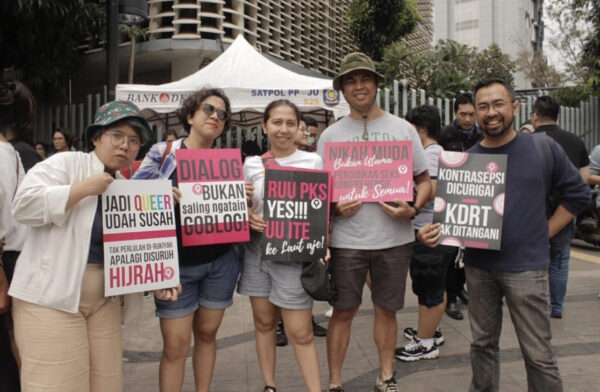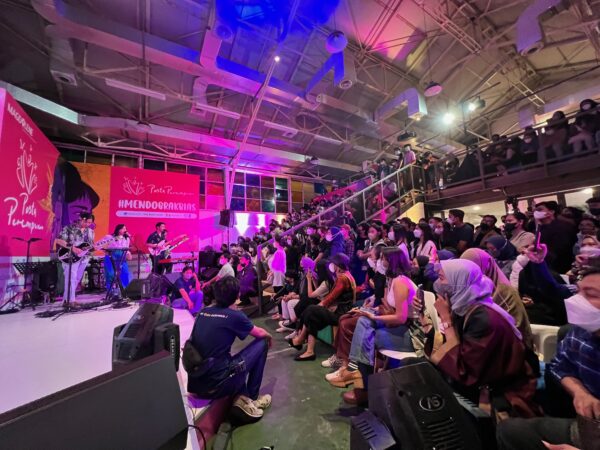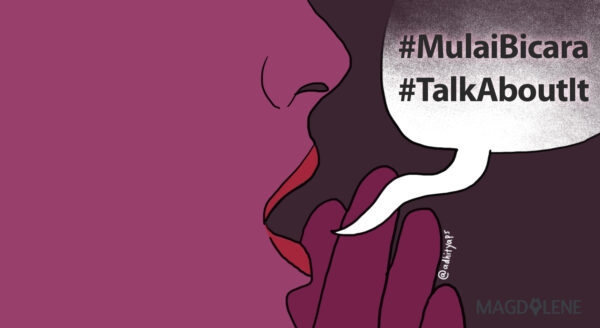
Indonesia’s Magdalene magazine
Feby Indirani
As a media company, Magdalene supports diversity, equality and inclusivity in the workplace by employing staff from various gender and sexual orientations, races and backgrounds. Part of Magdalene’s strategy is to normalise under-represented groups in the spotlight, so people can directly see it.
Magdalene, a bilingual online magazine, was created to inform and empower women with a range of feminist perspectives on sensitive and often taboo issues, such as gender and sexuality, in Indonesia’s patriarchal society.
Strategies include:
- Using popular culture
To reach the general audience, Magdalene uses popular themes from films, television shows, music and books as well as fashion and beauty trends as an entry point to discuss challenging and taboo issues.
-
Creating community-driven contentMagdalene conducts surveys and collects readers’ opinions through social media to produce content which explores the issues important to them, resulting in a significant growth in reader engagement and readership.
-
Solution-focused journalism
Not only highlighting ‘the problem’, Magdalene provides readers with an entry point to engage more deeply with difficult issues, and where appropriate, suggest potential responses to mitigate that problem.
- Visibility matters
Through its video content and public events, Magdalene increases the visibility of different cultures and genders (such as the Melanesian race and transwomen) to normalise diversity.
The first feminist online magazine in Indonesia, Magdalene was founded in 2013 by journalists Devi Asmarani and Hera Diani in Jakarta.

The Magdalene team at a women’s march in Jakarta, 2019, with founders Devi Asmarani (centre) and Hera Diani (second from left). Photo credit: Magdalene.
Magdalene’s slogan “Supporting diversity, empowering minds” sums up its mission. It is a platform for the voices of feminists, progressive groups and other marginalised sectors of Indonesia and covers under-reported and taboo subjects including, but not limited to, gender and sexuality, such as religion-based discrimination against women, race discrimination and LGBTQ rights in Indonesia’s patriarchal society.
The online magazine is visited by an average of 600,000 readers monthly and its Instagram page attracts approximately 102,000 followers. The largest audience is mostly 18- to 34-year-olds with a balance between females and males. The platform also welcomes content from freelance contributors, with a curating and editorial process in place to ensure quality. Readers from Indonesia as well as those from Malaysia and the Philippines enjoy the variety of articles, podcasts and videos produced in both Indonesian and English.
Aside from producing online content for their readers, Magdalene also hosts and sponsors public events, workshops, performances and discussions to raise awareness of important issues and takes part in women’s marches to grow its readership and expand its networks.

Magdalene hosted the Pesta Perempuan (‘Party for All Women’) public event in M Bloc Space, South Jakarta, with the theme ‘Breaking the Bias’ to support International Women’s Day 2022. Photo credit: Paul Emas.
Using popular culture
From its inception, Magdalene’s goal was to fill the void between the two different ends of the spectrum of mainstream media for women with its ‘light’ fashion and lifestyle content versus women’s academic journals with its complex language which is difficult to access by a general audience. Magdalene has managed to achieve a balance between these two ends of the spectrum by applying a gender lens to report on a whole range of issues concerning women and marginalised sectors of society without losing substance or impact.
The online content produced by Magdalene is organised under five main sections covering various sub-topics:
- Issues – politics and society, gender and sexuality, relationships and feminism
- Lifestyle – health and beauty, horoscope, travel and leisure
- Culture – screen raves, graphic series, prose and poem, Korean wave, boy’s love
- Wo/men we love – interviews with inspiring figures and celebrities
- Community – brand news and events.
Magdalene uses popular culture as an inlet to discuss challenging and taboo topics. For example, they discussed Papua and Melanesian race discrimination through articles about the beauty industry, talked through a Korean drama series to explore LGBTQ issues and used popular psychology such as ‘the 5 Love Languages’ to talk about dating violence. Over the years, they have developed an emotive approach to overall design for its content by using more persuasive language, colour and illustration. They tend to avoid using cold statistics and prefer to integrate the data into real-life examples to create a narrative which speaks more to the reader’s emotions.

An illustration featured in Magdalene’s article ‘How Shops Use Psychology to Influence Your Buying Decision’. Illustration: Karina Tungari.
Creating community-driven content
‘Listen’ is one of Magdalene’s corporate values and this is manifested in how their content is planned and produced. To understand the needs and experiences of their readers, they run online surveys, conduct forum group discussions and collect inputs from social media comments. For example, sex education is a subject which is considered taboo, with many parents, teachers and religious leaders in Indonesia tending to be prescriptive or avoiding the topic entirely due to concerns that it will encourage teenagers to have extramarital sex. In November 2021, Magdalene created a survey for teenagers aged 15 to 19 to understand how they perceived sex and why they need sex education. From the survey, 98.5% of respondents disclosed that they need sex education to help them start a healthy relationship and protect themselves even though they do not intend to have sex before marriage.
By asking their audience to share their stories and contribute their thoughts and opinions, Magdalene grew its readership significantly and maintained strong engagement with its readers.

Through social media, Magdalene always encourages its audience to share their experiences. Illustration: Adhitya Pattisahusiwa.
Solution-focused journalism
For many issues that receive ongoing news coverage, people tend to be more aware of what is wrong with society than what is being done to try to improve it. Magdalene wanted to move forward by focusing on a solution and what can be done to be actively involved to start a change. In 2020, when domestic violence rose during the coronavirus pandemic, Magdalene launched a program called ‘Safe Space’ as a hub with information and ways to receive support for those or someone others might know of who was experiencing violence.
Magdalene publishes articles that encourage people to believe they can contribute to a solution to the issue, with the topics such as ‘How men can contribute more to create safe space for women on campuses’ or ‘Things you can do when you are homophobic.’
Visibility matters
As a media company, Magdalene supports diversity, equality and inclusivity in the workplace by employing staff from various gender and sexual orientations, races and backgrounds. Part of Magdalene’s strategy is to normalise under-represented groups in the spotlight, so people can directly see it. The star of Instagram Reels, who became the face of Magdalene’s social account, is a highly talented transwoman. Magdalene also featured Melanesian women in their public events and campaign videos to increase the visibility of people from east Indonesia.
Feby Indirani
| Feby Indirani is an author and a content writer. Her works mainly focus on women and other minority groups. Her fiction stories have been translated into English, Italy, Germany and Japan and were appreciated by international media and academics. She initiated a campaign, Relax, It’s Just Religion to promote freedom of religion in Indonesia through arts and activism. She was a fellow of the Australia-Indonesia Muslim Exchange Program in 2006 and got her MA in Digital Media from University College London in 2019, sponsored by the Chevening scholarship. |
What is the Imagine Around the World Project?
A partnership with the British Council Australia, the Imagine Around The World Project aims to document case studies from numerous countries outside of US, UK, Canada, Australia and New Zealand to share best practice and leadership in cultural diversity, cultural equity and inclusion in the arts, screen and creative sectors. This project is managed by Diversity Arts Australia and supported by Creative Equity Toolkit partner, British Council Australia. To find out more click below – or read the other case studies as they go live here.

